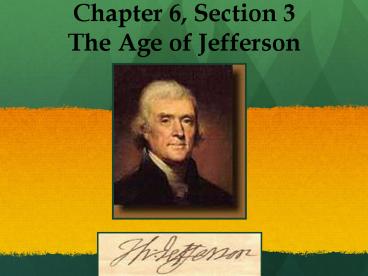Chapter 6, Section 3 The Age of Jefferson - PowerPoint PPT Presentation
Title:
Chapter 6, Section 3 The Age of Jefferson
Description:
Chapter 6, Section 3 The Age of Jefferson The Age of Jefferson Jefferson led the Democratic-Republicans. He won the election of 1800 and the party also took control ... – PowerPoint PPT presentation
Number of Views:99
Avg rating:3.0/5.0
Title: Chapter 6, Section 3 The Age of Jefferson
1
Chapter 6, Section 3The Age of Jefferson
2
The Age of Jefferson
- Jefferson led the Democratic-Republicans.
- He won the election of 1800 and the party also
took control of Congress and most of the state
governments. - His goal was to steer away from the things the
Federalists did with the government when
Washington and Adams were President.
3
Good Ideas
- Jefferson wanted to get rid of the Alien and
Sedition Acts and taxes on stamps, land, and
alcohol. - He cut the national debt from 80 million to 57
million. - He made major cuts to the army and navy.
- He streamlined the governments bureaucracy
- Made each government department and workers more
efficient. - Got money for land in the west from families
buying federal land.
4
John Marshall
- Chief Justice of the Supreme Court
- They were cousins but also political enemies.
- Marshall was a Federalist and had been appointed
the last minute by John Adams just before he left
office. - He participated in more than 1,000 court
decisions, writing over ½ of them, more than any
of the Supreme Court Justice ever.
5
Marshalls 4 Part Legacy
- Implemented Judicial Review.
- The power to review the acts of Congress and the
President to determine if they were
constitutional. - He made sure federal laws were superior to state
laws. - He broadly interpreted the Constitution.
- Implemented sanctity of contracts limited the
power of state governments to interfere with
business.
6
Midnight Judges
- Several federal judges were appointed in the last
days of John Adams administration. - They were all Federalists, it is clear that Adams
hope to secure Federalist control of the courts
since a DR would be President (Jefferson).
7
Marbury VS. Madison
- 1st case to assert the power of judicial review.
- President John Adams was about to leave office.
- He appointed William Marbury, a Federalist, a
justice for the D.C. - The incoming Secretary of State, James Madison,
refused to deliver the official papers of
appointment. - Marbury complained to the Supreme Court.
- Marshall ruled in favor of Madison
- DRs were happy because Marbury would not be in
office.
8
Why this case matters?
- Marbury vs. Madison established the power of
judicial review, ensuring that the Supreme Court
had the final authority to interpret the meaning
of the Constitution. - It also established the judiciary branch as an
equal partner in government.
9
The Nation Expands
- Jefferson considered defeating Spain in the
Louisiana territory and taking it over. - In 1801, Frances military dictator, Napoleon
Bonaparte, had forced Spain to give him the
Louisiana territory, including the strategic city
of New Orleans.
10
The Louisiana Purchase
- Jefferson offered to buy the territory from the
French. - 1803, Jefferson obtained the 828,000 square miles
for 15 million. - It doubled the U.S.s size, extending it west to
the Rocky Mountains. - He sent Meriwether Lewis and William Clark to
explore the territory in what became the Lewis
and Clark Expedition.
11
(No Transcript)
12
(No Transcript)
13
British Impressment
- The British navy angered the U.S. By relying on
impressment, or taking American sailors from
their ships and forcing them to serve in the
British navy. - By 1812, about 6,000 Americans had been impressed.
14
Embargo
- The U.S. Lacked a navy large enough
- to challenge the British fleet.
- Jefferson balked at the high cost of building of
bigger navy, which would undermine his policies
of reducing the national debt and keeping taxes
low. - In an attempt to prevent a war, Jefferson
persuaded Congress to declare an embargo
suspending trade by ordering American ships to
stay in port. - He expected the embargo to starve the British
and close their factories. - Instead, the British found other markets in South
America. - The embargo bankrupted American merchants.
- Jefferson lifted the embargo just before he left
office.































